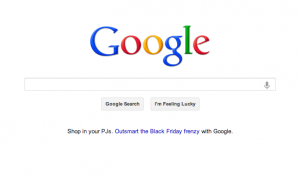Difference between revisions of "Google"
(→Data Centers) |
(→Data Centers) |
||
| Line 41: | Line 41: | ||
===Data Centers=== | ===Data Centers=== | ||
| − | As of 2012, Google owns and operates seven data centers in the United States, three in Asia, and three in Europe. | + | As of 2012, Google owns and operates seven data centers in the United States, three in Asia, and three in Europe. In 2012, Google began to offer inside looks into their data centers, capitalizing on the Google Street View technology. |
===Advertising=== | ===Advertising=== | ||
Revision as of 15:46, 10 December 2012
|
Google is a worldwide search, advertising, and service-based corporation. The largest U.S. based web company, Google has distinguished itself from other companies by adopting the catch-all mantra "don't be evil", and by avoiding the "corporate" feel that tech start-ups tend to fall into after experiencing massive growth.[1]. However, Google has come under harsh criticism for their data mining and targeted advertising practices, which was a catalyst for an increased amount of debate surrounding the ethical implications of privacy online.
Contents
Mantra
"Don't be evil." [2]
This mantra was established by Paul Buchheit and Amit Patel, both Google employees. Google claims that at the core of their company, "Don't be evil" encapsulates the values Google and their employees have. People have questioned at certain times. In 2006 when Google struck a deal with China to censor parts of Google, Steve Jobs made it public that he felt Google was not staying true to their mantra[3] .
History
Google was founded in 1998 by Larry Page and Sergey Brin. Page graduated from the University of Michigan with a Bachelor of Science in computer engineering. Brin, originally born in Russia, graduated from the University of Maryland, with a Bachelor of Science in computer science and mathematics. Both Page and Brin later attend Stanford University to complete their Master of Science degrees in Human Computer Interaction.
Google began as a research project at Standford, but quickly became a project worth pursuing, which Page and Brin decided to to run full time.[4]. Google was founded on September 4th, 1998 in Menlo Park, California and have since moved their headquarters to Mountain View, California.[5][6]
Their intention was to create a product to "organize the world's information and make it universally accessible and useful".[7] Since then, the company has rapidly expanded and produced a suite of products far beyond the initial search engine. Google acquires companies on a regular basis and has entered into many different markets.[8] It also leads the production of the Android operating system, the Chrome browser, and Google+, among other things.
After some Initial Financing, Google's initial public offering occurred on August 19, 2004 for $85 at 18,605,052 shares. With a starting market cap of $23 billion, the world began to realize that Google had potential. As of 2010, the company has 31,353 employees and total assets of $57.851 billion.[5]
Acquisitions
Since 2001, Google has acquired over 100 companies. Some of the most influential acquisitions include: Keyhole, Inc, Android, YouTube, DoubleClick, and GrandCentral. Many of these acquisitions eventually became key aspects of Google's platform, including Google Groups, GoogleEarth, and Google Sites. They also have partnerships with companies like NASA Ames Research Center, Sun Microsystems, AOL, Time Warner, Microsoft, Nokia, and Ericsson.
Data Centers
As of 2012, Google owns and operates seven data centers in the United States, three in Asia, and three in Europe. In 2012, Google began to offer inside looks into their data centers, capitalizing on the Google Street View technology.
Advertising
Advertising is the number one revenue source for Google; 99% of their total revenue comes from advertising. Google helped to engineer a new type of competitive advertising that ensures the highest bidder pays only 1 cent above the second place bidder. Additionally, the company helped popularize the Pay Per Click (ppm) model now used by the majority of online advertisers.
Adwords
Adwords is a Google campaign that allows advertisers to rent out space and pay on a cost per click (CPC) basis. Before Adwords, sites were allowed to choose their own "keywords" - the words used by Google to determine the appropriate search results. But Larry Page, in developing his famous "Page Rank" system, decided that advertisers should have to do less work and developed an algorithm that mitigated users gaming the system.
Google Products
Web
- Google Chrome is Google's web browser. It has built in malware and phishing protection, and auto updates to ensure the latest security fixes. Google Chrome also has Google search embedded in the navigation bar, making searching fast and easy.[9]
- Web Search Google is the most-used search engine on the web. Google uses a "PageRank" algorithm, named after Google founder Larry Page, to rank pages that show up in Google's results. The PageRank's main function is to search for text, on webpages in order to determine the relevancy to a user's search. Users also have the ability to filter their search result by category, including images, news, and books.[10]
Mobile
- Android Google's mobile platform, Android is the world's most popular mobile platform. Android allows users to utilize Google Apps, in addition to the 600,000 apps available on Google Play.[11]
Media
- Google Books allows users to search for books, and in some cases, see a preview or view the entire book. If a book is in the public domain, users are also able to download a PDF copy.
- [Google Play] originally called Google Music, Google Play allows users to upload their music and other documents so that they can be accessed on other devices. Google Play syncs automatically, and can also be set to enable offline use.
- Google Images is Google's specific search engine for photos.
- Google News is similar to Google images, Google News filter search results to only display news articles.
- Picasa has been integrated into Google+, allowing users to easily share their images with their Circles on the social networking site.[12]
- Picnik After being acquired by Google in 2010, Picnik worked to create photo editing software for Google+. Though the site no longer exists, many of Picnik's features can be found in the Creative Kit in Google+.[13]
- Videos Google Videos is Google's search engine for video content.
Geo
Home & Office
Social
Innovation
- Fusion Tables
- PageRank
- Self-driving Cars
- Google Glass
Google TV
Introduced in 2010, it is the first fully integrated web and TV platform that is expected to have a major impact in the internet TV market. Google TV is based on the Android operating system, the Chrome web browser and an Intel chipset. Google TV lets users surf the internet, download, and run Android apps full-screen or in a picture-in-picture window while watching TV. Viewers can even use their Android phones as remote controls. The service is available in two forms: Box buddy and integrated TV. Box buddy is a small box that sits between your existing cable (or satellite) receiver and the TV, that can connect to the internet through Wi-Fi. It also comes with a remote to control your cable box, TV, and stereo. The integrated TV setup is built right into specific TV models, such as many Vizio and Sony brand TVs.
Ethical Implications
Search Engine
Google is the most popular search engine, controlling 65.5% of the search engine market. By using the company's search engine, billions of users are providing Google with data about their personal preferences, which Google claims is used to show advertisements more relevant to its users. This information can be used to create a detailed personal image of a user. However, Google has many privacy features that allow user to search/use their products anonymously, such as Google Chrome's anonymous browsing mode, Incognito. To combat some of these criticisms, Google also provides many tools to opt-out of having your data collected.[15][16] [17]
There are also concerns about the algorithms Google uses to rank pages - many accuse the system of being biased, and favoring certain pages over others.
Additionally The Google search bar is programmed to auto complete while a user is typing, which can influence user searches. Some people argue that this allows Google to think for users by influencing them to search for certain things.
Google Translate
There are also ethical implications associated with Google Translate. Google translate often translates things literally, meaning that things get lost in the translation. This can relate to plagiarism in an academic environment, where students often use Google Translate to cheat for foreign language assignments and projects. Google translate should only be used as a reference for academic preparation, and should not serve as the sole way to translate a language as often teachers and professors can detect when such translators are over-used (implying plagiarism on the student's behalf).
Google Street View
There have been growing concerns regarding Google Street view; people are worried about appearing in Google Street View images. Some argue that it is not ethical to capture these pictures without the consent of those who may appear in them. Furthermore, people not only worry about themselves appearing in Google Street View images, but also worry that personal information such as vehicle license plate numbers, their children, and their pets may be visible on Google Street View images.
Google+
Google+ creates similar ethical concerns to other social media sites, like Facebook. Privacy, ownership and censorship are three of the most prominent. However, Google's social media platform is still relatively young and is still improving, meaning that some of these concerns may be addressed in updates to the site.
The first privacy issue with Google + is that as of July 31, 2011 it is mandatory that all profiles are public on Google+. While you can choose what you wish to be public information, Google+ is mandating that a person's gender is publicly displayed on their profile (unlike Facebook which does not require genders to be posted publicly on a person's profile page). [18] Another privacy issues with Google+ is that comments are as public as the post they belong to, so if a person comments on a post that is public then they're comment will be publicly available even if they have privacy settings that make their comments private, this is because the person whose post they commented on has their privacy settings set to public. This also leads to another privacy concern, that people you share with can re-share with their own circles (which also may be public and not private, even if you yourself have your settings marked as private). [19]
Google Now
Google premiered their own version of a virtual personal assistant called Google Now, with the latest update to Android 4.1 (Jelly Bean) for their Android phones. It uses natural language to help respond user questions, integrated with other Google/Android products to provide accurate results. This directly rivals with the iPhone's Siri, Apple's virtual assistant. It simplifies many phone functions to a simple voice command. It raises some ethical concerns such as GPS data being logged by default and calculates how far one walks and bikes each month. [20] Google Now can use GPS data to also pull up local businesses around you, based on your previous searches. User default privacy settings on such items are not very clear at the moment.
Copyright
Google, specifically Google Books and YouTube have been accused numerous times of breaching copyright law.
Nymwars
Nymwars refers to the ongoing dispute of requiring internet service users to use their real names when using a particular service. When Google+ launched in summer 2011, Google mandated users supply their real names; however, when users supplied a nickname instead, Google expelled them from the site. This ignited a conflict within the blogging community, revolving around the idea of a right to anonymity online. Google chairman, Eric Schmidt, responded to angry bloggers, explaining that Google+ was intended to be an identity service, and therefore, the usage of real names is imperative.[21] Recently, Google has encouraged YouTube users to supply their real name.[22]
China
On March 22, 2010 Google China shut down due to disputes over censorship. It re-routed all mainland attempts from China to Hong-Kong's uncensored version of the site. This move by Google represented moral objections to repeated attacks from Chinese hackers on Google accounts. However, Google has maintained many if its Chinese operations and has not pulled out of the country completely. It's redirection of users was a step towards stopping internet censorship, though the Chinese government has clearly stated that self-censorship is a non-negotiable legal requirement.
Initial Censorship of Search Results
In 2006, Google made the decision to censor search results for the Chinese version of their search service, located at Google China. Multiple groups spoke out about the company's decision, but Google responded to the negative feedback by stating that they felt they could make a more positive contribution in China by maintaining operations. They also stated that providing some results rather than none fit better with their company mission.[23]
Cyberattack and Removal of Censorship
Google was a target of a cyberattack on January 12, 2010. The company reported that it was one of many targets, across multiple industries and that the attack had originated in China. Human rights activists interested in the well-being of those in China seemed to be the primary targets, according to Google. These attacks resulted in theft of intellectual property. Shortly after the event, Google threatened to leave China if the cyberattacks and intrusions did not stop.[24][25] In March of 2010, Google announced that they were going to redirect all Google.cn traffic to Google.hk, the domain for Google in Hong Kong. Doing so essentially removed all censorship that Chinese users were affected by prior to this change.[26] This seems to have been in response to continued cyberattacks after Google's warning.
See Also
- Android
- Censorship
- Data Aggregation Online
- Information Transparency
- Larry Page
- Nymwars
- Social Networking
- Social Networking Services
- Stop Online Piracy Act
- Targeted Advertising
- Google Street View
- Google Books
External Links
References
- ↑ http://www.bloomberg.com/news/2010-11-15/facebook-passes-ebay-in-value-becoming-no-3-u-s-web-company.html
- ↑ Telecom Circle Google: Don’t be Evil
- ↑ http://www.telecomcircle.com/2010/08/google-dont-be-evil/
- ↑ Google, 1995-1997
- ↑ 5.0 5.1 Google Our history in depth
- ↑ Google, 2004
- ↑ Google, Company
- ↑ Scores, Google
- ↑ Google,Chrome
- ↑ Wikipedia, Google Search
- ↑ http://www.android.com/about/
- ↑ http://support.google.com/picasa/bin/answer.py?hl=en&answer=93773
- ↑ http://www.picnik.com/home
- ↑ Youtube | http://en.wikipedia.org/wiki/Youtube
- ↑ AlterNet, Conspiracy Researcher Says Google's No Good
- ↑ Google on Wikipedia
- ↑ http://www.google.com/policies/privacy/tools/
- ↑ http://googleplus.wonderhowto.com/inspiration/4-possible-privacy-issues-pay-attention-google-0128578/
- ↑ http://googleplus.wonderhowto.com/inspiration/4-possible-privacy-issues-pay-attention-google-0128578/
- ↑ http://phandroid.com/2012/11/01/google-now-now-tracks-the-distance-you-walk-bike-or-travel-in-a-month/
- ↑ http://delivery.acm.org.proxy.lib.umich.edu/10.1145/2250000/2240247/p29-boyd.pdf?ip=141.213.236.110&acc=ACTIVE%20SERVICE&CFID=154975552&CFTOKEN=66670065&__acm__=1355097860_cf88c622f39395228608597fd879aad6
- ↑ http://youtube-global.blogspot.com/2012/06/choosing-how-youre-seen-on-youtube.html
- ↑ BBC,Google censors itself for China
- ↑ TechCrunch, Google Defends Against Large Scale Chinese Cyber Attack: May Cease Chinese Operations
- ↑ NYT, [1] Google Shuts China Site in Dispute Over Censorship
- ↑ BBC, Google stops censoring search results in China




